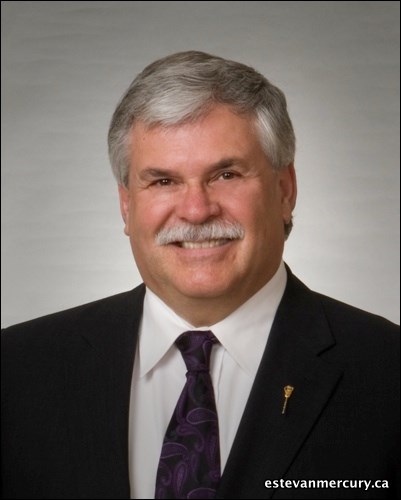The minister Responsible for Rural and Remote Health was in Estevan on July 30 as part of his summer visitation schedule, which means barbecues not ministry announcements.
Randy Weekes said the community engagement calendar this summer has been an ambitious one, with Estevan being the 12th call on the list.
Weekes said the general conversations during the informal meetings and luncheons has usually focused on physician recruitment and retention, and primary health care.
Asked if he had any concerns raised regarding underutilization of hospitals and health care centres in rural Saskatchewan, Weekes said that topic had not been raised during the conversations.
"I am not hearing underutilization of hospitals as a problem," he said.
Weekes also said the anticipated announcement regarding a CT scanner for St Jospeh's Hospital in Estevan, was not on his agenda for the visit to the Energy City.
"It's a meet and greet event. I met with the physicians, mayors and community leaders, and yes, the scanner was brought up, but I have nothing to add. That's a topic down the road, probably for budget considerations next spring," Weekes said.
"But we are aware of it and determining that if it comes, it's done as a partnership with the ministry."
When asked what the implications might be if the local health care committee simply purchased a CT scanner, installed and operated it for two years with certified personnel, which is a proposal already in the Health Ministry's hands, Weekes said the project would first have to get approval from the Sun Country Health Authority and the Health Ministry. He did not wish to speculate on what the implications or repercussions would or could be if a local committee acted on its own.
Contacted after the press conference, St. Joseph's executive director Greg Hoffort said the local committee still has their sights set firmly on a 2013 announcement regarding a CT scanner.
Weekes did say, however, that communications between the ministry and the rural health regions needed improvement as well as communications among the health regions themselves.
The minister added that there have been no discussions held recently regarding future amalgamations or boundary changes for health regions, like there has been for constituency representations.
Weekes said that before his tours are completed, he will have visited over 40 communities. He noted he had toured some in the winter and had been present for the recent sod-turning ceremony for the Kipling Health Centre in the Sun Country region.
Working in a ministry within a ministry (Rural and Remote Health works as a sub-ministry within the Health Ministry and Minister Dustin Duncan), has not created any conflicts or confusion regarding files and projects, he said.
Weekes added that physician recruitment and retention in rural Saskatchewan is receiving a boost with a financial incentive program for new medical graduates, and there is now a more efficient system of certifying international recruits and the number of seats in the medical college at the University of Saskatchewan was recently bumped up from 60 to 100.
The Health Ministry and Ministry for Rural and Remote Health are also seriously considering a physician residency program in Sun Country. There are four other residency programs underway in major centres outside of Saskatoon and Regina.
Improved efficiency measures are already underway in the health regions with the Lean initiative, he said. Those practises have already rewarded the health centres practically and financially.




